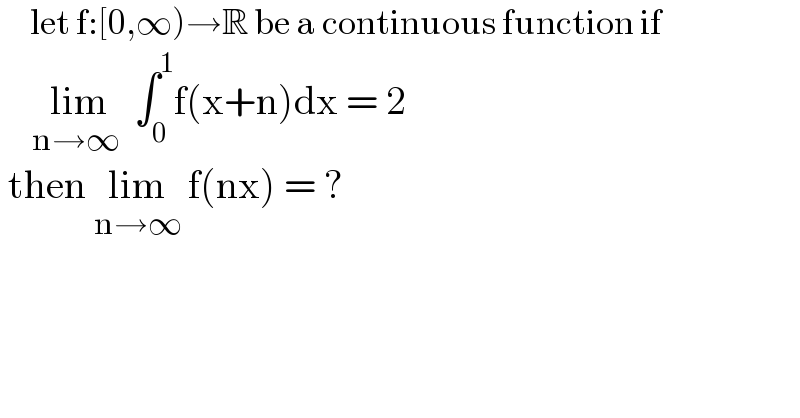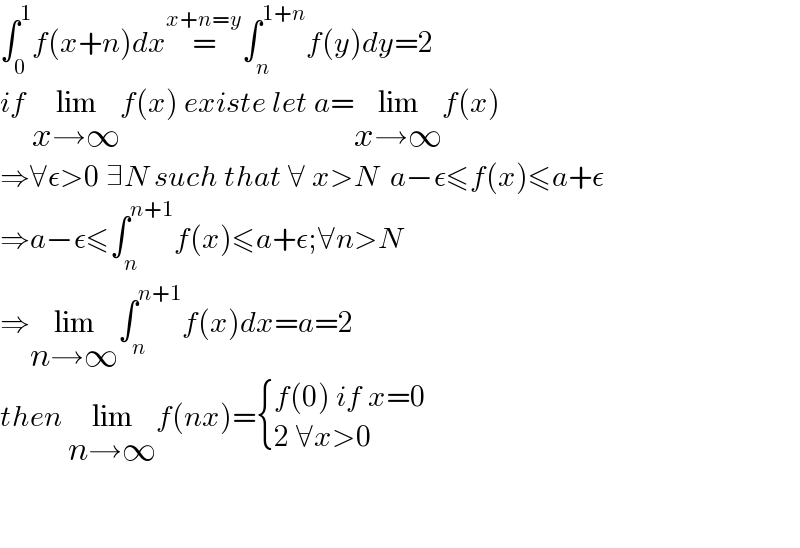
Question Number 206433 by universe last updated on 14/Apr/24

$$\:\:\:\:\:\mathrm{let}\:\mathrm{f}:\left[\mathrm{0},\infty\right)\rightarrow\mathbb{R}\:\mathrm{be}\:\mathrm{a}\:\mathrm{continuous}\:\mathrm{function}\:\mathrm{if} \\ $$$$\:\:\:\:\underset{\mathrm{n}\rightarrow\infty\:} {\mathrm{lim}}\:\int_{\mathrm{0}} ^{\mathrm{1}} \mathrm{f}\left(\mathrm{x}+\mathrm{n}\right)\mathrm{dx}\:=\:\mathrm{2} \\ $$$$\:\mathrm{then}\:\underset{\mathrm{n}\rightarrow\infty} {\mathrm{lim}}\:\mathrm{f}\left(\mathrm{nx}\right)\:=\:? \\ $$$$\: \\ $$
Answered by Berbere last updated on 14/Apr/24

$$\int_{\mathrm{0}} ^{\mathrm{1}} {f}\left({x}+{n}\right){dx}\overset{{x}+{n}={y}} {=}\int_{{n}} ^{\mathrm{1}+{n}} {f}\left({y}\right){dy}=\mathrm{2} \\ $$$${if}\:\underset{{x}\rightarrow\infty} {\mathrm{lim}}{f}\left({x}\right)\:{existe}\:{let}\:{a}=\underset{{x}\rightarrow\infty} {\mathrm{lim}}{f}\left({x}\right) \\ $$$$\Rightarrow\forall\epsilon>\mathrm{0}\:\exists{N}\:{such}\:{that}\:\forall\:{x}>{N}\:\:{a}−\epsilon\leqslant{f}\left({x}\right)\leqslant{a}+\epsilon \\ $$$$\Rightarrow{a}−\epsilon\leqslant\int_{{n}} ^{{n}+\mathrm{1}} {f}\left({x}\right)\leqslant{a}+\epsilon;\forall{n}>{N} \\ $$$$\Rightarrow\underset{{n}\rightarrow\infty} {\mathrm{lim}}\int_{{n}} ^{{n}+\mathrm{1}} {f}\left({x}\right){dx}={a}=\mathrm{2} \\ $$$${then}\:\underset{{n}\rightarrow\infty} {\mathrm{lim}}{f}\left({nx}\right)=\begin{cases}{{f}\left(\mathrm{0}\right)\:{if}\:{x}=\mathrm{0}}\\{\mathrm{2}\:\forall{x}>\mathrm{0}}\end{cases} \\ $$$$ \\ $$$$ \\ $$
Commented by aleks041103 last updated on 14/Apr/24

$${f}\:{is}\:{continious}\:\nRightarrow\:\exists\underset{{x}\rightarrow\infty} {{lim}}\:{f}\left({x}\right) \\ $$$${example}:\:{f}\left({x}\right)={sin}\left({x}\right),\:\underset{{x}\rightarrow\infty} {\nexists{lim}\:{f}\left({x}\right)} \\ $$$${therefore}\:{your}\:{solution}\:{is}\:{wrong} \\ $$
Commented by Berbere last updated on 14/Apr/24

$${yes}\:{you}\:{right}\:{i}\:{dont}\:{why}\:{i}\:{said}\:{That} \\ $$
Answered by Berbere last updated on 14/Apr/24

$${f}\left({x}\right)=\mathrm{2}+{cos}\left(\mathrm{2}\pi{x}\right) \\ $$$$\int_{\mathrm{0}} ^{\mathrm{1}} \left(\mathrm{2}+{cos}\left(\mathrm{2}\pi{x}\right)\right)=\mathrm{2}\:{no}\:{limite}\: \\ $$$$ \\ $$
